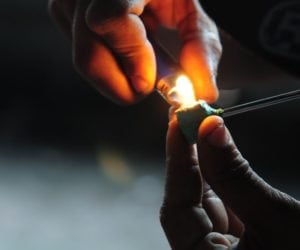24 Signs of Crack Use

Signs of Crack Use: 24 Common Signs That Can Indicate Current or Long-Term Use
Crack cocaine is a free-base version of the well-known drug cocaine. The effects that the drug has on the mind and its immediate “high” when it is smoked cause this drug to be highly addictive. The past-year abuse of crack cocaine in 2016 showed that 970,000 people between the ages of 18 to 25 were abusing the drug and a further 1.29 million people over the age of 26 had abused it. By recognizing the signs of crack use, one can avoid the escalating addictive behavior that the abuse of the substance causes.
Immediate Signs of Crack Use
Some of the signs of crack use appear when a person is currently affected by the use of the drug. The high that the drug causes can lead to several tell-tale signs that others can notice. They are as follows:
- Dilated pupils
- Inflated sense of self and euphoria
- Intensely focused
- Bursts of energy
- They find it difficult to sleep
- Possible nosebleeds
- Twitching of the muscles
- They don’t feel hungry
- Elevated breathing rate
- Restless
- Burns on the fingers or lips from smoking crack cocaine
- Some of the crack addict behaviors include imagining bugs crawling under their skin
- Further crack addict behavior includes sudden mood swings
- Violent behavior
- Hallucinations and psychosis
Long-Term Effects of Crack Abuse
Long-term signs of crack use can be another indicator of the substance abuse, and often reveals a much larger problem. These signs may also be some of the only signs you see if the addict takes crack in secret.
Long-term signs include the following:
- A noticeable decline in cognitive performance.
- Weight loss and general malnutrition.
- Cardiovascular issues, which can result in a stroke or a heart attack.
- Psychosis and confusion.
- Depression and anxiety can be signs of long-term crack abuse.
- The teeth, mouth and lips may become damaged.
- The development of a tolerance, which requires that the addict abuse higher amounts of crack as time goes by.
- They have cravings or become restless when they haven’t had their fix.
- Withdrawal symptoms such as anxiety, mood swings, exhaustion, agitation and nightmares are present when the person hasn’t used to the drug recently.
Getting Help
One of the facets of a physical dependence to a substance such as crack is the extremely uncomfortable and overwhelming withdrawal symptoms that set in when they try to stop. However, the entire process of detox only takes around five days in most cases and can be helped by the medications available through a crack detox program.
A crack detox program, commonly referred to as a medical detox or medically-assisted detox, reduces the symptoms that a person experiences during their withdrawal, such as the severe depression and cravings. Medications are often prescribed and dispensed in a controlled manner to prevent abuse from taking place. Some addicts may experience post-acute withdrawal syndrome, which are long-term withdrawal symptoms that often need to be treated through a medically-assisted approach or the addict could experience symptoms such as depression for months.
In order to achieve long-term sobriety, an addict must also go through counseling and therapy. This treatment helps by uncovering problematic behavior and providing the person with alternative coping skills. Once treatment ends, the recovering addict must then carry on with aftercare services, such as sober living homes and support groups, in order to maintain their abstinence.
If you or a loved one needs help with abuse and/or treatment, please call the WhiteSands Treatment at (877) 855-3470. Our addiction specialists can assess your recovery needs and help you get the addiction treatment that provides the best chance for your long-term recovery.
